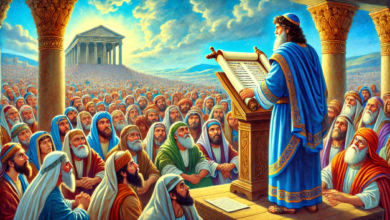
Introduction
In a world full of noise, distraction, and constant motion, one of the greatest spiritual dangers we face is forgetfulness—not simply forgetting facts or routines, but forgetting who God is, what He has done, and who we are because of Him.
In today’s Gospel, Jesus speaks tenderly but firmly: “If you love me, you will keep my commandments… and the Advocate, the Holy Spirit… will teach you everything and remind you of all that I told you” (John 14:15, 26). This reminder from Jesus is not just theological—it’s deeply personal.
God knows our hearts are prone to wander. That’s why He gives us the Holy Spirit—not only as teacher and guide, but as the divine Reminder. The Spirit brings back to our hearts the truth we’ve heard, the love we’ve known, and the identity we so often forget.
This reflection explores the sacred role of memory in the life of faith:
- Why remembering God’s deeds is essential
- How forgetting who we are leads to spiritual confusion
- The way our everyday words and actions reveal what we’ve remembered—or forgotten
- And how the Eucharist, the Church’s greatest act of remembrance, draws us into a living encounter with Christ
At the heart of it all is the gentle invitation of God:
“Remember Me.”
Not just at Mass. Not just in suffering.
But in everything.
This is not just a call to look backward. It’s a call to live forward—anchored in divine love, guided by the Holy Spirit, and transformed by sacred memory.
Memory in Scripture and Tradition
Throughout salvation history, God calls His people to remember.
- “Remember the Lord your God, who brought you out of Egypt.” (Deuteronomy 8:2)
- “Do this in memory of me.” (Luke 22:19)
In fact, the entire liturgy—especially the Eucharist—is an act of sacred remembering. Not just recalling a past event, but making present the saving reality of Christ’s death and resurrection.
The Holy Spirit as the Divine Reminder
Jesus knows our hearts are forgetful. Not forgetful in the sense of losing facts, but in losing focus, faith, and fidelity.
That’s why He sends the Holy Spirit—not just as a teacher, but as a divine “reminder”:
- To bring Christ’s words to life again within us.
- To refresh our hearts with the truth we may already know, but need to remember anew, especially in moments of doubt or suffering.
Psalm 78:7 and the Power of Remembering
Psalm 78 gives us a clear warning. It recalls how Israel continually forgot the works of God:
“That they too might put their trust in God, and not forget the works of God, keeping his commandments.” (Psalm 78:7)
Each time the people forgot, they rebelled. But when they remembered, they trusted. This is not just historical—it’s prophetic. In our own lives, forgetting God’s goodness often leads to doubt, sin, and isolation. But when we remember, we find hope, clarity, and direction.
Real-Life Example
Think of a married couple. The strength of their love is built on shared memory—how they met, what they’ve endured, the promises made. If one forgets those memories, the relationship weakens. It’s the same with God.
Consider also a parent and child. A child who forgets the sacrifices a parent made may grow resentful or entitled. But one who remembers love given freely, meals prepared quietly, tears wiped away in the night, walks in humility and gratitude.
Or think of a nation. When a country forgets its founding ideals or the struggles endured by previous generations, it begins to fracture. Division creeps in. The past is not honored, and the future becomes confused.
It is the same with our faith. When we forget the Cross, when we stop recalling the miracles in our own lives, we drift. We lose our grounding. But when we remember—when we choose to revisit God’s work in us—we return to center. Our hearts soften. Our decisions change. And our love deepens.
Forgetting Who We Are
Sometimes the greatest tragedy is not just forgetting what God has done, but forgetting who we are because of what He has done.
We are God’s beloved children. We are temples of the Holy Spirit. We are redeemed. We are called.
But how quickly we forget—
- When we lash out in traffic,
- When we gossip about a coworker,
- When we speak sharply to a family member,
- When we isolate ourselves or judge others harshly.
It’s like a spiritual amnesia creeps in and we begin to act out of fear, frustration, pride—or simply routine. One moment, we’re lifting hands in worship, and the next, we’re raising our voices in anger.
But the Holy Spirit reminds us not only of Jesus’ words,
He reminds us of our identity in Christ.
He whispers,
“You are a child of God. You are not your anger. You are not your shame. You are not your past. You are loved. You belong. You are called to live differently—because you are different.”
To remember God is to remember who we are in Him—and who others are, too.
This remembrance changes how we drive, how we speak, how we forgive, how we love.
It’s not about pretending to be holy—it’s about living out the truth that we already belong to Him.
The Communal Memory of the Church
This sacred remembering is not only personal; it’s communal.
The Church remembers together:
- In the Liturgy of the Word and Eucharist
- In the Creed
- In the lives of the saints
- In the passing on of the faith through generations
When we gather, we do more than pray. We enter a shared memory—one that reminds us not just of doctrine, but of divine love at work across centuries.
The Eucharist: Living Memory, Ever-Present Gift
At the heart of our faith, at the heart of remembering, is the Eucharist.
This is no ordinary remembrance.
When Jesus said, “Do this in memory of me” (Luke 22:19), He wasn’t simply asking His disciples to recall a past event. He was instituting a mystery—an eternal present, a living memorial where heaven touches earth.
The Catechism of the Catholic Church teaches us:
“In the liturgy of the Church, it is principally his own Paschal mystery that Christ signifies and makes present. During his earthly life Jesus announced his Paschal mystery by his teaching and anticipated it by his actions. When his Hour comes, he lives out the unique event of history which does not pass away: Jesus dies, is buried, rises from the dead, and is seated at the right hand of the Father ‘once for all.’ His Paschal mystery is a real event that occurred in our history, but it is unique: all other historical events happen once, and then they pass away, swallowed up in the past. The Paschal mystery of Christ, by contrast, cannot remain only in the past, because by his death he destroyed death, and all that Christ is—all that he did and suffered for all men—participates in the divine eternity, and so transcends all times while being made present in them all. The event of the Cross and Resurrection abides and draws everything toward life.”
(CCC 1085)
In the Eucharist, we don’t merely remember—we enter into the sacrifice of Calvary.
We are not passive observers; we are participants in a mystery of love and mercy made present.
The altar becomes the foot of the Cross. The chalice becomes the cup of the New Covenant. The Host becomes the Lamb who was slain.
And it is here—at the altar—that we are most perfectly reminded of:
- Who God is: the One who gives Himself completely.
- What He has done: rescued us from sin and death.
- Who we are: beloved sons and daughters, fed and formed by the Body of Christ.
The Eucharist is the source and summit of the Christian life (Lumen Gentium 11).
It is the place where memory becomes communion, where what Christ did once is continually made present, not symbolically, but sacramentally, substantially, and truly.
To forget the Eucharist is to forget the center of our faith.
But to remember—to live Eucharistically—is to let the Holy Spirit anchor us again and again in divine love.
This is why we must approach the Eucharist with reverence, hunger, and awe. Because it is in this sacred act of remembrance that we are healed, renewed, and transformed.
Memory as a Foundation for Faithfulness
When we forget God’s goodness, we wander. But when we remember—when we recall His love, His faithfulness, His promises—we find strength to trust and obey.
Memory leads to love, and love leads to obedience:
- “If you love me, you will keep my commandments.”
But how can we love and keep His Word if we do not remember it?
This is why daily prayer, Scripture reading, and the sacraments are essential: they keep our memory alive and sharp.
Final Thought:
In a world full of noise, forgetfulness is one of the greatest threats to faith. But the Holy Spirit comes to rekindle our memory, to renew our love, and to remind us that we are never alone.
This remembering is not just individual—it is communal. As members of the Church, we are part of a sacred memory kept alive through the liturgy, the sacraments, and the witness of the saints. Every time we gather at Mass or pray together, we re-enter the story of salvation. We do not walk alone—we walk with the Church, with Mary, with the saints, and with all who have gone before us in faith.
The Holy Spirit, who reminds us personally of Christ’s words, also unites us in the collective memory of the Body of Christ. And it is in this shared remembrance that our faith is strengthened, deepened, and made fruitful.
So today, ask the Holy Spirit to remind you—
- Of what God has done in your life,
- Of the truth proclaimed in the life of the Church,
- And of the victory sung by the saints and martyrs.
Let memory become the ground where faith grows stronger.
Prayer to the Divine Reminder: Holy Spirit of Truth
Come, Holy Spirit,
Spirit of the Living God,
Promised by the Son,
Sent by the Father,
You who proceed from love eternal—
Come and dwell within me.
You are the Advocate,
The Comforter of hearts,
The Fire of remembrance in a world gone cold.
You are the Voice who speaks not your own,
But all that the Son has spoken—
And all that the Father has willed.
Today I confess: I forget.
I forget who I am.
I forget who God is.
I forget the mercy that saved me,
The grace that sustains me,
The truth that sets me free.
I forget the words of Jesus,
Because I let the world speak louder.
So come, O Holy Spirit, and remind me.
Stir within me the sacred memory of love.
Remind me of every word Jesus has spoken—
Even the ones I tried to forget,
Even the ones that pierce and heal.
Teach me again the wisdom of obedience,
That love is not a feeling, but a decision—
To say “yes” to God,
Even when my heart is weary or afraid.
Remind me that His commandments are not burdens,
But paths to life,
Roads to freedom,
Arrows pointing home.
Breathe upon the dry places in my soul.
Bring to mind the moments when God was near—
In my joy and in my sorrow,
In my victories and in my wandering.
Make me remember His faithfulness
So I may walk forward in trust.
Remind me that I am not alone—
That even now, You dwell within me.
You are not a guest but a gift.
Not a fleeting wind but a burning flame.
You are the indwelling Spirit of Christ—
The very breath of God in my lungs.
In my weakness, be my strength.
In my silence, be my song.
In my forgetfulness, be my memory.
In my confusion, be my teacher.
And when the world tempts me to forget again—
Remind me of Calvary.
Remind me of the empty tomb.
Remind me of the Upper Room,
Where fear became fire,
And silence gave way to proclamation.
Let me live in remembrance—
Not of guilt, but of grace.
Not of shame, but of salvation.
Not of loss, but of the Love that conquered death.
Come, Holy Spirit.
Stay, Holy Spirit.
Remain with me always,
That I may remain in Christ
And Christ may remain in me.
Amen.






